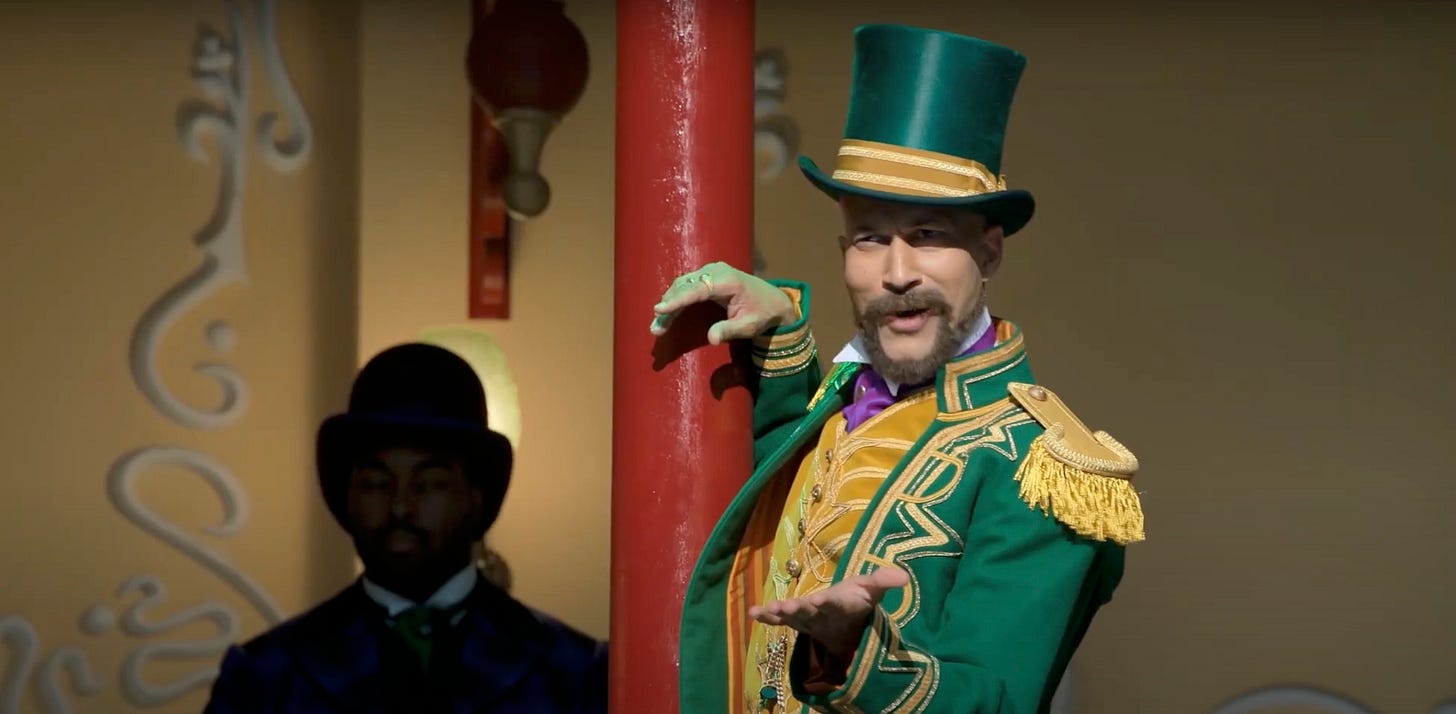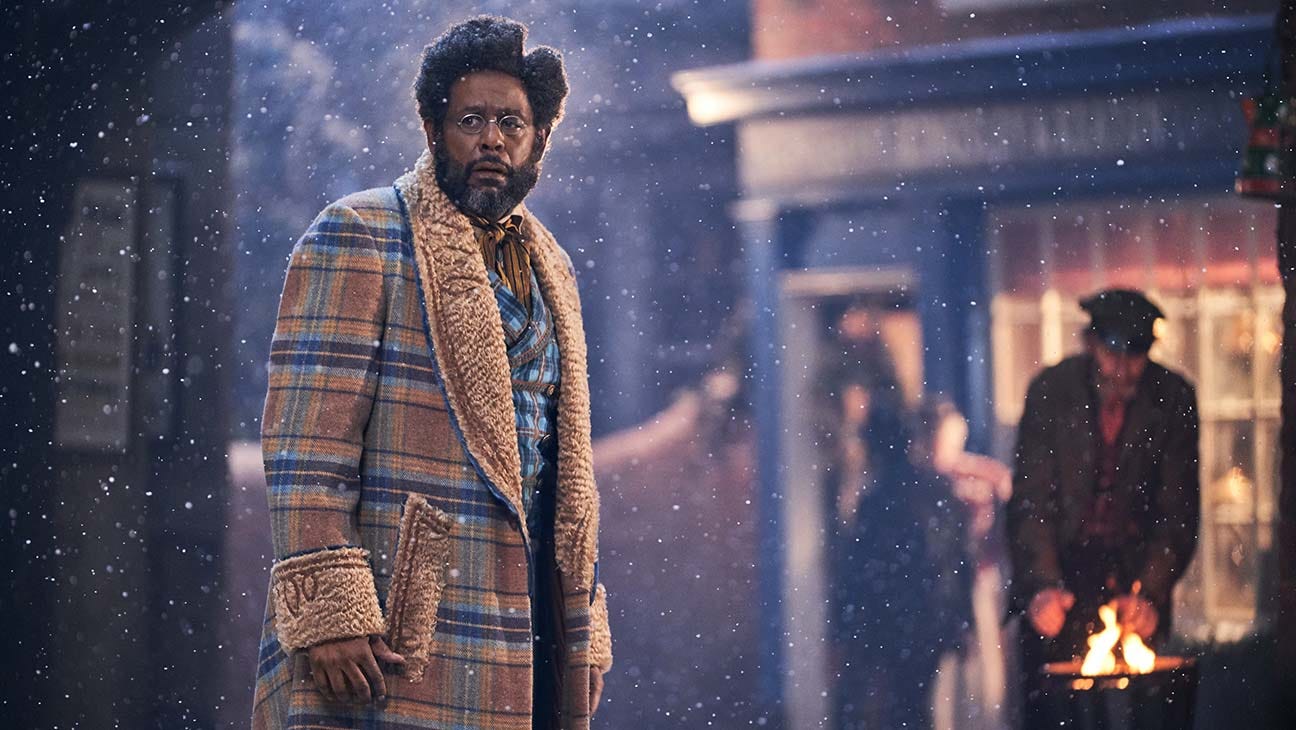When I was in prison, I worked hard at assembling a list of movies I wanted to see from magazines and newspapers. But streaming services had begun to blossom, and with them, an entirely new ecosystem of movies. Theoretically, anyway: I had no way of knowing whether or not these movies were actually real. Often I would read about some films – say, a Netflix movie where Jared Leto went undercover with the Yakuza – and wonder, is this real, or is the world having a laugh at my expense?
No movie sounded nearly as phony to me as “Jingle Jangle: A Christmas Journey”. I liked the idea of an all-Black cast putting together an original Christmas production with song and dance and a legitimately-impressive cast. But the movie is actually called “Jingle Jangle”? And it has a colon?? There is the immortal Ghost Dog, Forest Whitaker, but he’s playing Jeronicus Jangle? His name is Jeronicus Jangle, you say? Nope, no way I’m believing that is a real thing. Keegan Michael-Key’s presence felt like a tell – he’s exactly the type of guy you’d put into a fake movie.
Now I am on Netflix, I’ve discovered that it is real! “Jingle Jangle” is an actual movie, guys and girls! And I had my doubts, almost a half hour into the movie. You see, Jeronicus “Ghost Dog” Jangle is an inventor who has fallen on hard times. He created a tiny automated matador (Ricky Martin, or I dreamed this, unsure) who subsequently flees from his control, forming a union with fellow inventor Gustafson (Key). Now that Jangle is old and embittered (and you know Ghost Dog is as committed to this particular performance as he is to any other), he watches the bills pile up at Jangles And Things (ooof, work on your branding, Ghost Dog) while Gustafson is creating an entire empire of toys based off of Jeronicus’ ideas. Key is an enjoyable performer in any venue, and he tears into this part with rambunctious soft shoe routines and a lighthearted but not toothless villain performance.
Jeronicus’ granddaughter Journey, full of wonder and whimsy, soon arrives to spend quality time with the surly, uninterested Jeronicus. As she tries to prove that the Jangle bloodline accommodates young genius, he rebuffs her, as he does a local postwoman (Lisa Davina Philip) who clearly fancies the old widower. But his stress is considerable – Jangles And Things is about to close unless he can conceive of a new toy. Carefully watching is Gustafson, ready to steal another Jangle idea for his suddenly-flailing enterprise.
“Jingle Jangle” is an original movie, produced by John Legend and featuring a few new Legend arrangements. But often, it feels oddly stagebound, likely to compensate for the minimal sets. A few times, the camera is capturing a performer as they sing and/or dance specifically facing an invisible audience theoretically off-screen. It does move at a reasonable pace, helped by its candy-coated visuals and an overwhelming need to speedrun through an overly-complicated narrative. As Journey, little Madalen Mills is a little bit of sunshine. She makes it sound like a real concept when she sings “The square root of impossible is possible in me,” which would sound like some X-Men nonsense coming from anyone else.
What separates this from the usual holiday streaming churn, other than above-average technical details all around, is the surprisingly haunted work from Forest Whitaker. His Best Actor Oscar-winning turn in “The Last King Of Scotland” may be category fraud (he very much is not the lead character in that movie) but Whitaker has otherwise never truly gotten the proper respect over a career than spans every genre, every budget, every type of movie one could imagine. As the preposterously-named Jeronicus, he hunches over his creations, his thick shoulders almost radiating an antisocial spirit that allows him a vivid character arc, from disillusioned workaholic, bruised beyond understanding, to warm, beaming father figure. I would say you almost forget this is Ghost Dog, but come on, none of us will ever forget Ghost Dog. Power and equality.
When I was in prison during the first Trump administration, a part of me felt like the world was experiencing a slight shadow of my life. Suddenly, you were under the hand of a bunch of goons, and you had to surrender to the incompetent hand of blustery macho bureaucracy, and a culture too ashamed to ever take the blame for their own mistakes. Each morning in prison I woke up thinking, “What is it now?” while expecting to hear about some inexcusable screw-up by a blundering chain of fools that would cut into our meals, our recreation time, or even our mail – I felt this is a bit like how regular citizens spent several days under Donald Trump.
When I got out, I had hoped to not live under such conditions again. Oops. And now I am hearing of the ramped-up approach to deporting illegal immigrants, a procedure just screaming with the likelihood of collateral damage, seen and unseen. Among what is being discussed is a culture of snitching. Reward and bounties are being discussed, Trump cronies turning illegal immigrants into trophies and giving shallow motivation to turn people against people. This is sickening, but it’s not unlike how I survived in prison. Everywhere you turned, you weren’t sure if someone was looking a little too closely at your side hustle, or at your bunkmate’s extracurriculars, or even simply the way you moved. Snitch Culture turns men against each other, makes everyone suspicious and gives everyone an impetus to live a secret life, lest they be hassled by the wrong people. And now it’s mainstream. Thank you, President Trump, for turning a slice of my prison lifestyle into an everyday way of life.
Next week, we delve into the world of SCIENCE FICTION!








This movie (to me) felt magical. I know it’s not plausible but most Christmas movies aren’t. It felt like a stage musical, because it should’ve been one. Anika Noni Rose who played the adult daughter is a Broadway performer, and Whitaker and Key, and the post mistress could both easily be as well. Rashad has been on Broadway multiple times. It should’ve been the little girl making her debut. My take is that it would’ve been much better as a stage musical for the reasons you didn’t like it- plot holes could’ve been tweaked, add more dancing, play to audience. It had potential that way. But at least it showed some people that their heroes were not just one dimensional.